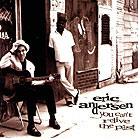June 2000
But Andersen, one of the original early-'60s Greenwich Village singer-songwriters, long ago earned the right to include whatever he wants to -- even if he occasionally exercises poor taste. And anyone would want to include "The Meadowlark," co-written with the late Townes Van Zandt. Built of tightly structured four-line ballad verses in a minor key and relying heavily on minor chords, Andersen’s voice backed up mainly with guitar arpeggio, it begins, "Darkness sparkles the edge of dawn like a heart that’s turned stone cold/The ones I love are dead and gone and I am growin’ old/My heart is whisperin’ go back north, to the north I truly love/I’d follow the geese but they’re heading south, so I’ll follow the mourning dove." True music to the ears of a folk-music lover like me! It incorporates folk music’s simple chord structures with a simple, pleasing melody and a natural world that speaks to the singer. The same goes for the moving opening track, "Eyes of the Immigrant," also supported mainly by Andersen’s trademark steady guitar arpeggio. Its refrain is somewhat reminiscent of Woody Guthrie’s "Deportees" and Paul Simon’s "American Tune," a very good thing. That song provides an ironic lead-in to "You Can’t Relive the Past," co-written with Lou Reed, whose voice joins Andersen’s in the four-line refrain, whose third line is different each time: "You can’t relive the past/You can’t relive the past/The dam is burst the acid’s spilt/You can’t relive the past. Alternate third lines: "No mask could hide your liberty"; "You sit alone with your remote control"; "Your future’s now just getting’ up"; and "You’re driftin' like a wooden doll." "Magdalena," too, pulls me in with Andersen’s confident, straightforward folk technique. In this one, Robert Aaron’s clarinet and flute and Erik Frielander’s cello ornament the melody. A tribute to cellist Ann Sheldon, who worked with Andersen in 1984 and later died in a car crash, it begins (after "Ooo ooo ooo ooo," included a bit obsessively in the liner notes), "Magdalena, you can’t come back for me/Running in your long black cape/Magdalena, don’t turn to look at me/I think the tears might stain your face." These lines are aptly echoed in the concluding verse: "Magdalena, now don’t forget me/Running in your long black cape/Magdalena, don’t try and reach for me/No turning back you can’t escape." The cape easily reminds one of the classic "Long Black Veil," sung by Joan Baez, Mick Jagger, and others. With several fine songs delightfully sung by Andersen and skillfully arranged, what annoys? Apparently owing to his early inspiration by rock ’n’ roll, which led him also to admire blues, Andersen keeps trying those genres. This time, recording the CD’s several rock and blues tunes in Mississippi with aging blues musicians was supposed to do the trick -- "although I’m not a blues artist," as he says in the liner notes. But something about Andersen’s style makes him a folksinger and not a rocker -- the careful enunciation is part of it. Noticing after almost 40 years at the grindstone that even his folk songs are slow and plaintive, he might consider staying with his strong suit for more consistently fine collections. The rock and blues numbers here are not disastrous, but just as you can’t relive the past, not all folksingers can cross over, no matter how strong an impulse from the past drives them to try. GO BACK TO: |
 Eric Andersen -
You Can't Relive the Past
Eric Andersen -
You Can't Relive the Past![[Reviewed on CD]](../format/regcd.gif) As an
Eric Andersen fan of the early 1970s -- after his earliest work but in time for Blue
River and Be True to You and a performance at Philadelphia’s (actually,
Bryn Mawr’s) famous and long-since-closed Main Point -- I find his recent release, You
Can’t Relive the Past, delightful and also annoying. It contains several
excellent songs. Ambitious ones, too: 12 of the 13 are longer than four minutes, most over
five. The last track, the uninteresting, inexplicably included only instrumental on the
disc, "Possum Reprise," comes in at 1:18.
As an
Eric Andersen fan of the early 1970s -- after his earliest work but in time for Blue
River and Be True to You and a performance at Philadelphia’s (actually,
Bryn Mawr’s) famous and long-since-closed Main Point -- I find his recent release, You
Can’t Relive the Past, delightful and also annoying. It contains several
excellent songs. Ambitious ones, too: 12 of the 13 are longer than four minutes, most over
five. The last track, the uninteresting, inexplicably included only instrumental on the
disc, "Possum Reprise," comes in at 1:18.